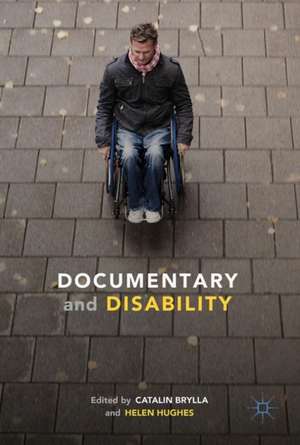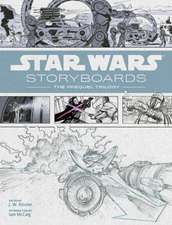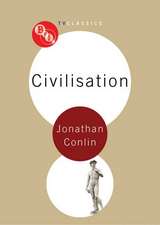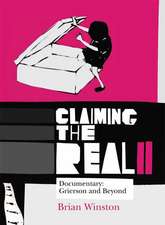Documentary and Disability
Editat de Catalin Brylla, Helen Hughesen Limba Engleză Hardback – 4 oct 2017
Preț: 1007.49 lei
Preț vechi: 1228.65 lei
-18% Nou
Puncte Express: 1511
Preț estimativ în valută:
192.82€ • 200.77$ • 162.95£
192.82€ • 200.77$ • 162.95£
Carte tipărită la comandă
Livrare economică 10-24 martie
Preluare comenzi: 021 569.72.76
Specificații
ISBN-13: 9781137598936
ISBN-10: 113759893X
Pagini: 254
Ilustrații: XV, 299 p. 20 illus. in color.
Dimensiuni: 148 x 210 x 24 mm
Greutate: 0.66 kg
Ediția:1st ed. 2017
Editura: Palgrave Macmillan UK
Colecția Palgrave Macmillan
Locul publicării:London, United Kingdom
ISBN-10: 113759893X
Pagini: 254
Ilustrații: XV, 299 p. 20 illus. in color.
Dimensiuni: 148 x 210 x 24 mm
Greutate: 0.66 kg
Ediția:1st ed. 2017
Editura: Palgrave Macmillan UK
Colecția Palgrave Macmillan
Locul publicării:London, United Kingdom
Cuprins
1. Introduction: The Bricolage of Documentary and Disability (Catalin Brylla, Helen Hughes).- 2. Part One: Film Practice - Chapter 2: Not Without Us – Collaborating Across Difference in Documentary Filmmaking (Samuel Avery).- 3. Visual Psychological Anthropology and the Lived Experience of Disability (Annie Tucker, Robert Lemelson).- 4. Valorising Disability on Screen: When did ‘Inspirational’ Become a Dirty Word? (Veronica Wain).- 5. Spectatorship and Alternative Portrayals of Blindness (Catalin Brylla.- 6. Aberrancy and Autobiographical Documentary (Phoebe Hart).- 7. Part Two: Representation - Chapter 7: Thomas Quasthoff and the Performativity of Disability in Michael Harder’s The Dreamer (Anna Drum, Martin Brady).- 8. Rethinking Ability and Disability in the Work of Johan van der Keuken (Hing Tsang).- 9. (Dis)abling the Spectator: Embodying Disability Experience in Animated Documentary (Slava Greenberg).- 10. The Poetics of Touch: Mediating the Reality of Deafblindness in Planetof Snail (Anne-Marie Callus).- 11. Sexual Dissidence and Crip Empowerment in Yes, We Fuck! (Andrea García-Santesmases).- 12. Part Three: Identity, Participation and Exhibition - Chapter 12: Accessing Alternative Ethical Maps of In(ter)depenent Living in Global Disability Documentary (David T. Mitchell, Sharon L. Snyder).- 13. Interface Productions and Disability Programming for Channel 4: 1984 – 1986 (Tony Steyger, Jamie Clarke).- 14. Disability and the Para-TV Communities of Reality Television (Anita Biressi).- 15. Singing Altogether Now: Unsettling Images of Disability and Experimental Filmic Practices (Robert Stock).- 16. To Document is to Preserve: Moving Pictures and Sign Language (Magdalena Zdrodowska).- 17. Documenting Neuropolitics: Cochlear Implant Activation Videos (Beate Ochsner).- 18. On Andrew Kötting’s Mapping Perception (Helen Hughes).
Notă biografică
Catalin Brylla is Senior Lecturer in Film at the University of West London, UK.
Helen Hughes is Senior Lecturer in Film Studies at the University of Surrey, UK.
Helen Hughes is Senior Lecturer in Film Studies at the University of Surrey, UK.
Textul de pe ultima copertă
This edited collection of contributions from media scholars, film practitioners and film historians connects the vibrant fields of documentary and disability studies. Documentary film has not only played an historical role in the social construction of disability but continues to be a strong force for expression, inclusion and activism. Offering essays on the interpretation and conception of a wide variety of documentary formats, Documentary and Disability reveals a rich set of resources on subjects as diverse as Thomas Quasthoff’s opera performances, Tourette syndrome in the developing world, queer approaches to sexual functionality, Channel 4 disability sports broadcasting, the political meaning of cochlear implant activation, and Christoph’s Schlingensief’s celebrated Freakstars 3000.
Caracteristici
Foreword by Michael Schillmeier The first book length study on documentary and disability Offers a timely contribution to contemporary debates on inclusion and the future of media Demonstrates that documentary film has not only played an historical role in the social construction of disability but continues to be a strong force for expression, inclusion and activism Presents a diverse range of contributors who are academics, practitioners and activists in the field











